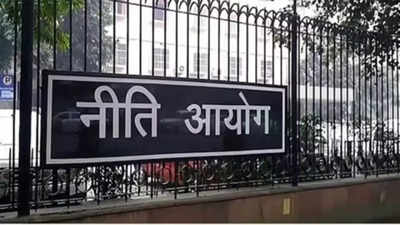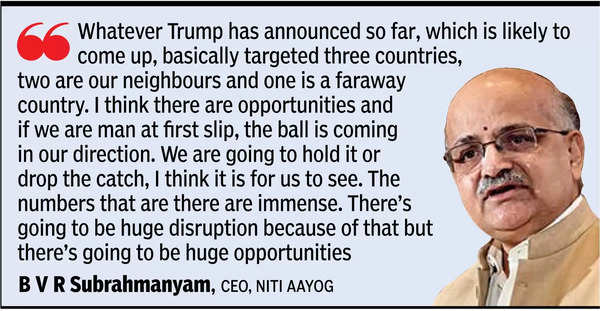
NEW DELHI: The
US-China trade war
presents both challenges and opportunities for India, a report by govt think tank Niti Aayog said on Wednesday, calling for enhancing
domestic manufacturing capabilities
particularly in high tech industries. It, however, said India has seen limited success so far in capturing the China plus one strategy as countries, such as Vietnam, Thailand, Cambodia and Malaysia, have emerged as bigger beneficiaries of the shift.
The US has imposed tighter export controls and tariffs on Chinese goods to limit China’s growth and spending for technological progress and this has led to fragmentation of global supply chains. This has also prompted multinational companies to look alternatives to Chinese manufacturing, the report said, while detailing the US China tensions and technology trade wars.

“Whatever Trump has announced so far which is likely to come up, basically targeted three countries, two are our neighbours and one is a faraway country. I think there are opportunities and if we are man at first slip, the ball is coming in our direction. We are going to hold it or drop the catch, I think it is for us to see. The numbers that are there are immense. There’s going to be huge disruption because of that but there’s going to be huge opportunities,” B V R Subrahmanyam, CEO at Niti Aayog told reporters during the launch of the inaugural edition of the think tank’s Trade Watch quarterly report, which is expected to be a key input for evidence based policymaking.
The report said the domestic iron and steel industry, representing 23.5% of its EU exports, faces highest exposure under the proposed carbon tax or CBAM (carbon border adjustment agreement).
The report said that Indian steel companies may incur tariffs of 20-35%, leading to higher costs, reduced competitiveness, and lower demand in the EU market. Compliance costs will rise due to the need for detailed emissions reporting, according to the report which offers a snapshot of the country’s trade position, combining global demand-supply perspectives, sectoral performance, and insights into emerging trade opportunities.
“With geopolitical shifts and a growing emphasis on sustainability, India must implement policy measures to ensure coherence between trade and environmental goals, aligning its long-term trade objectives with global trends,” said the report.
Discover more from CaveNews Times
Subscribe to get the latest posts sent to your email.
























![Exploring the Serene Beauty of Nature: A Reflection on [YouTube video title]](https://cavemangardens.art/storage/2024/04/114803-exploring-the-serene-beauty-of-nature-a-reflection-on-youtube-video-title-360x180.jpg)





















